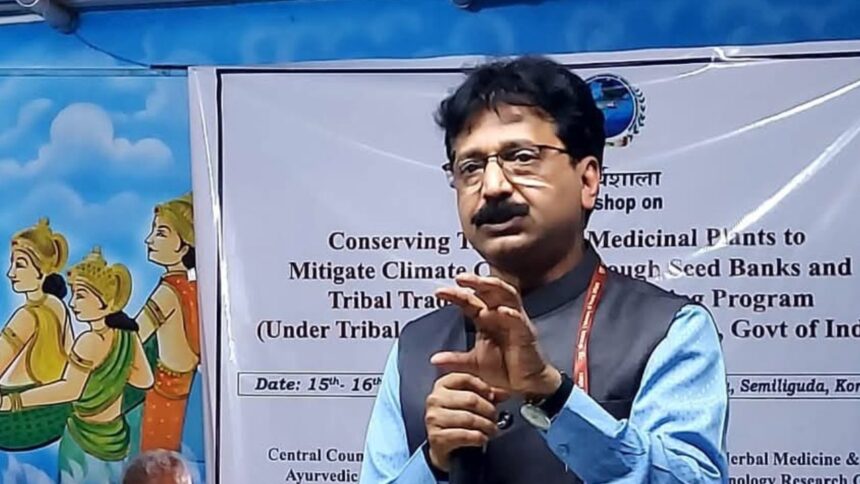NewzVille Desk
Professor Vaidya Rabinarayan Acharya, Director General of Central Council for Research in Ayurvedic Sciences (CCRAS) has been awarded the prestigious D.Sc. (Doctor of Science) Degree, the highest academic research degree by Utkal University, Bhubaneswar.
The recognition came for his research on the ethnomedicinal plants of the Gandhamardan Hills of Odisha, exploring their immense potential to enrich the Ayurveda Pharmacopoeia of India.
The title of his thesis was “Phyto-Pharcognostical and biological evolution of certain extra-pharmacopoeial Plants (Anukta Dravya) of Ayurveda available in Odisha”
With this achievement, Prof Acharya became the first person in India to be awarded a D.Sc. in Ayurveda (Dravyaguna).
Achieving the milestone Prof Rabinarayan Acharya says, “I am delighted to have this prestigious Degree Award. Deep gratitude to my mentors, peers, and everyone who supported me on this journey. This is a small step towards preserving our rich traditional knowledge and promoting the scientific value of Ayurveda.”
The research thesis was highly appreciated by Prof Ravi Rao S of Karnataka Ayurveda Medical College & Hospital, Prof B S Prasad of NCISM, Prof SMS Samarakoon, University of Colombo, Prof SKMK Herapathdeniya, University of Colombo.
Born in Jagatsinghpur district of Odisha Professor Acharya is serving as the DG in CCRAS, New Delhi since 28 February 2022. He was a Professor of Dravyaguna (Ayurveda Pharmacology) at ITRA, Previously he was a Professor of Dravyaguna and Dean at ITRA, Jamnagar, Gujarat.
Prof Acharya is having more than 30 years of teaching and research experience in the fields of drug research. He has published more than 400 research articles in peer-reviewed journals.
He has also authored five books, three monographs, and 12 chapters, and holds one patent. He has contributed as a course writer for IGNOU, a WHO temporary advisor, and an honorary member of the WHO-GTMC Expert Editorial Committee.
To his credit Prof Rabinarayan Acharya has represented India in eleven countries, including WHO meetings on herb-drug interaction, pharmacovigilance, and research priority settings.






